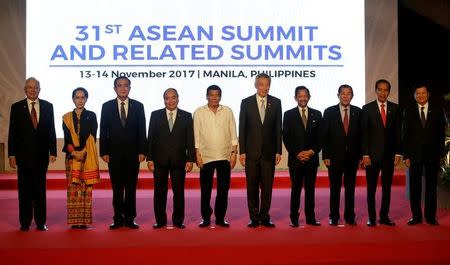Southeast Asia not taking South China Sea thaw for granted - summit draft
By Manuel Mogato
MANILA (Reuters) - Southeast Asian nations will not take a relative calm in the dispute over the South China Sea for granted, according to a draft of a statement to be issued during a summit meeting in Manila on Monday.
The statement will be issued after a meeting between China and the 10-member Association of Southeast Asian Nations (ASEAN) in the Philippines capital, a diplomatic source said.
"While the situation is calmer now, we cannot take the current progress for granted," said the draft, a copy of which was seen by Reuters.
"Important that we cooperate to maintain peace, stability, freedom of navigation in and over-flight above the SCS (South China Sea), in accordance with international law. It is in our collective interest to avoid miscalculations that could lead to escalation of tensions."
Almost all of the South China Sea, one of the world's busiest waterways, is claimed by China. Taiwan and four ASEAN nations - Malaysia, Vietnam, the Philippines and Brunei - have competing claims.
Leaders from China, the United States and seven other nations are joining ASEAN at its annual summit.
U.S. President Donald Trump said on Sunday he was prepared to mediate between claimants to the disputed South China Sea.
Asked about his comments, Chinese Foreign Ministry spokesman Geng Shuang said that China upheld resolving the issue via talks with the countries directly involved and to uphold the peace and stability of the South China Sea.
The situation in the South China Sea was generally stable and heading in the right direction with the joint efforts of China and ASEAN countries, he said.
China has been angered in the past by freedom of navigation patrols in the South China Sea, and comments on the issue, by the United States which it sees as provocative.
On Sunday, Philippine President Rodrigo Duterte suggested that, despite their differences, the leaders should not discuss the South China Sea.
"We have to be friends. The other hotheads would like us to confront China and the rest of the world on so many issues," Duterte said at a business conference.
"The South China Sea is better left untouched. Nobody can afford to go to war. It can ill-afford a violent confrontation."
China's Premier Li Keqiang, speaking in Manila during a summit with ASEAN member nations, said Beijing was "committed to working with ASEAN to be good neighbours, good friends and good partners, and to always stand together rain or shine."
At the meeting's formal opening on Monday, Duterte made no mention of the South China Sea and pointed to other triggers for a threat of violence in the region.
"Terrorism and violent extremism endanger the peace, stability, and security of our region because these threats know no boundary," he said.
Duterte has grown closer to China since he took office last year and Vietnam has emerged as Beijing's main challenger in the area. China's move to pressure Vietnam to stop oil drilling in a disputed area in July brought relations between the Communist neighbours to a low.
But on Sunday, Vietnam's state television said Chinese President Xi Jinping had told Vietnam's General Secretary, Nguyen Phu Trong, he wanted to work with Southeast Asian nations on a code of conduct in the sea. China's Xinhua news agency said China and Vietnam had agreed to properly handle maritime issues and strive to maintain peace and stability.
Yet some observers think underlying risks remain.
"Despite reduced tensions in the last 12 months, the dispute could erupt again at any moment," said Singapore-based South China Sea expert Ian Storey.
"Hence the emphasis on concluding a "substantive and effective" Code of Conduct as soon as possible to prevent incidents at sea from occurring and escalating into a serious crisis."
(Additional reporting by James Pomfret and Enrico dela Cruz in Manila, Ben Blanchard in BEIJING and Greg Torode in Hong Kong; Writing by Raju Gopalakrishnan; Editing by John Chalmers and Nick Macfie)



